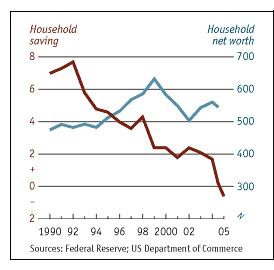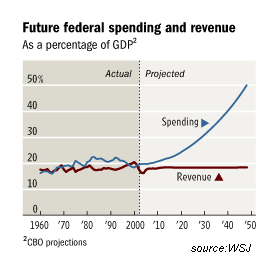

|
| weblog/wEssays | home | |
|
The Coming Conflagration (January 17, 2006) If a foreign power wanted to destroy the economic foundations of our nation, here is how the enemy would set up an economic conflagration of unequalled size and ferocity:  1. The U.S. government would spend trillions more than it collects and borrow the difference from foreign
governments and investors whose interests may diverge from America's--for instance, China and
most oil-producing nations.
1. The U.S. government would spend trillions more than it collects and borrow the difference from foreign
governments and investors whose interests may diverge from America's--for instance, China and
most oil-producing nations.
If you doubt this has already occurred, then read this item: (CNSNews.com) President Bush and the current administration have borrowed more money from foreign governments and banks than the previous 42 presidents combined, a group of conservative to moderate Democrats said Friday.China's Foreign Currency Reserves Grow to $818.9 Billion, Up 34 Percent From a Year Ago reports Yahoo News, stating that 2/3 of what will soon be $1 trillion in reserves is held in U.S. Treasuries. 2. American citizens would save nothing, heightening their dependence on foreign lenders. The fact that the savings rate in the U.S. is negative (i.e. we are collectively spending more than we earn and borrowing the difference) has been oft-noted in the past few months (see above chart).  3. U.S. pension plans would be woefully underfunded, insuring a no-win
showdown between cash-strapped taxpayers and powerful public employee unions.
This "war" between those employees promised unaffordably rich pensions back in
flush times and the overburdened taxpayers
who will rebel at the higher taxes required to pay the fat pensions and medical
benefits is no secret:
3. U.S. pension plans would be woefully underfunded, insuring a no-win
showdown between cash-strapped taxpayers and powerful public employee unions.
This "war" between those employees promised unaffordably rich pensions back in
flush times and the overburdened taxpayers
who will rebel at the higher taxes required to pay the fat pensions and medical
benefits is no secret:
America's Pension Time Bomb 4. Ensure that American economic growth depends not on true prosperity (selling more products and services than you buy, saving money and investing it in productive assets, socking away money to pay for future pensions, etc.) but on an entirely false prosperity of borrowing money from real estate assets which have reached bubble-like heights of speculative excess. 5. At a critical juncture, the dollar will weaken under the weight of all this debt, causing foreign holders to dump dollars and U.S. bonds in vast quantities. This selling will sink the value of the dollar to unprecedented lows and force the Treasury to pay extremely high interest rates on new debt. Why is this so? Just ask yourself this simple question. If another currency was dropping like a stone (say, the Mexican peso, just as an example), why would you buy bonds denominated in that currency? The second you buy, your investment drops in value as the currency tumbles. History suggests the only way to entice foreigners to buy your depreciating debt is to offer them very high interest rates to compensate them for the inevitable decline in the value of the bonds. How much interest will the Treasury have to offer to get foreigners to buy our trillions in bonds once the dollar slips? 10%? Or even higher? What happens when interest rates go to 10% or even 15%, as they did in the 1980s? Financial conflagration. As Adam Florzak has shown on his PactAmerica blog, if the interest on America's $8 trillion in public debt rises to a historically modest 8%, the interest payments will eat up almost half of all tax receipts, leaving relatively little for defense, social spending, Medicare, etc. Such high interest rates will also pop the housing bubble, wiping out people's ability to borrow money to spend freely on consumer goods. It won't happen, you say, because Americans will buy up that $8 trillion in bonds. Oh really? With what? Money pulled off their credit cards? Americans save zero money! No, no, you insist; Fed Chairman Bernake says there's a worldwide glut of savings; foreigners have no place else to put their money except the mighty dollar and U.S. debt. But what if that isn't savings at all, but excess liquidity flowing from the Fed overseas via our $800 billion a year trade deficits? Well, uh, gosh, maybe the foreigners who have been buying all our bonds for a meager 4% return could park their money elsewhere--say, in their own debt or their own assets. Then who's gonna buy all our debt? If no one's buying, how can we run another $400 billion in deficits next year? And what about the $1 trillion in bonds which come due and have to be re-sold every year? Here's yet another news story on the problem: Analysts Fear Expanding U.S. Deficits Endanger Economic Health, Lead to Higher Borrowing Costs. No enemy of the nation could have engineered a more pernicious and dangerous scenario than the one we have set up ourselves: "It may sometimes be expedient for a man to heat the stove with his furniture. But he should not delude himself by believing that he has discovered a wonderful new method of heating his premises." Ludwig von Mises * * * copyright © 2006 Charles Hugh Smith. All rights reserved in all media. I would be honored if you linked this wEssay to your site, or printed a copy for your own use. * * * |
||
| weblog/wEssays | home |